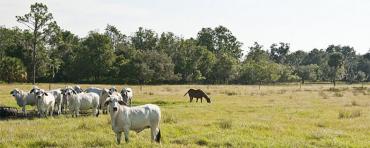
It seems every legislative session there's one pariah -- an issue so unpopular it can barely buy a committee hearing let alone a vote. Among the notable pariahs I remember over the years were school choice, gambling and, of course, guns. There have been others.
But none was as vital to the Florida economy as this year's pariah, agriculture.
It seems to me we plain didn't like ag at the Capitol this session.
Never mind that for more than 120 years, agriculture -- ranching included -- was Florida's fiscal bedrock. It still is. It's second only to tourism as the state's most valuable industry, employing two million people and each year contributing more than $120 billion to the state economy.
But we all know what happened to the politicians last year who campaigned on the merits of Florida agriculture. Ask Adam Putnam and Matt Caldwell, for instance. Those poor devils proudly defended farming AND the Second Amendment. In November they disappeared quicker than a couple of American tourists at a Bolivian taxi stand.
It's no mystery how ag became a pariah:
The new governor and the Everglades Foundation's paid posse blamed agriculture -- specifically, Big Sugar -- for poisoning the St. Lucie and Caloosahatchee Rivers with blue-green algae, and the Gulf with fish-killing red tide. Never mind that science never supported a word of it.
But that wasn't the worst of it. The biggest move to pariah-ize agriculture came about six weeks before the Legislature convened, when Gov. Ron DeSantis fired the entire South Florida Water Management District Governing Board for having the nerve to follow the law and extend a sugar company's lease. And then, even though ag is a District stakeholder, the governor appointed not a single representative from agriculture among the board's replacements. I believe for legislators who wanted to curry favor with DeSantis, that alone became a powerful statement.
The mass removal was a show of revenge. As one senator told me, "The governor has made it plain, it's agriculture or clean water. This isn't a year we can like both, and nobody is prepared to challenge him."
So, lawmakers found it easy-peasy to throw one of the state's most effective tools for protecting Old Florida, the Rural Family Lands Protection Program, under the bus.
I truly believe casting this 18-year-old, good-news program adrift and unfunded is one of the 2019 session's biggest fails.
What this program does is buy conservation easements, preventing future development of the land and allowing agricultural operations to continue to contribute to Florida's economy. It's the state partnering with Florida's farmers and ranchers. Their land stays productive, on the tax rolls and -- like so much of Florida's undeveloped rural land -- an environment for wildlife of all kinds, from panthers and bears to deer and wild fowl. Watch the video on this page -- farmers and ranchers explain it better than I have.
Last July I had the privilege of visiting the 1,400-acre Sampala Lake Ranch in Madison County, one of the last four properties approved for preservation under the Rural Family Lands Protection Program. Sampala Lake is a breathtaking working cattle ranch. This conservation easement combines open space, aquifer recharge, a Spanish mission dating back to the 16th Century, and working agricultural lands with wildlife corridors.
Together, all four properties approved by the Cabinet last summer amounted to more than 8,300 acres. They brought the total land preserved by the program to over 50,660 acres through 45 conservation easements.
RFLPP is very different from Florida Forever, the state's premier conservation and recreation lands acquisition program. In 2001 Florida Forever replaced Preservation 2000 (P2000), the largest public land acquisition program of its kind in the United States. With approximately 10 million acres managed for conservation in Florida, more than 2.5 million of them were purchased under the Florida Forever and P2000 programs.
Since the inception of the Florida Forever program in July 2001, the state has purchased more than 770,279 acres of land with a little more than $3 billion.
Florida Forever was grossly underfunded this year, but at least its value to the state was discussed and considered. Lawmakers didn't even throw the Rural Family Lands Protection Program a bone. A program doesn't get funded one year, it's easy to ignore it the next, and even easier the year after that.
If the governor had wanted to keep the Rural Family Lands Protection Program solvent, he would have fought for it, as he did for VISIT FLORIDA. He would have shown leaders in the Legislature how valuable this program is to Florida. That didn't happen.
Reach Nancy Smith at nsmith@sunshinestatenews.com or at 228-282-2423. Twitter: @NancyLBSmith


